Assessing HR Patterns, Policies, and MNC Role in Global Business
VerifiedAdded on 2023/01/11
|12
|3734
|97
Essay
AI Summary
This essay provides an in-depth analysis of human resource practices within multinational corporations (MNCs). It begins with an overview of HRM, highlighting the significance of societal, historical, economic, and political factors influencing HR patterns across different countries. The main body delves into the forces driving convergence and factors preventing it, supporting the path dependency view. It explores the role of MNCs in international trade, emphasizing their influence on global economies and the ethical considerations surrounding their business processes, particularly concerning human rights, worker rights, and environmental regulations. The essay also examines how MNCs contribute to the convergence of corporate HRM practices within corporate governance systems. Furthermore, it discusses how technological advancements and innovation influence the performance of multinational companies. The essay concludes by underscoring the importance of ethical practices and the need for MNCs to balance profitability with their responsibilities towards employees and global communities.

Essay
1
1
Paraphrase This Document
Need a fresh take? Get an instant paraphrase of this document with our AI Paraphraser
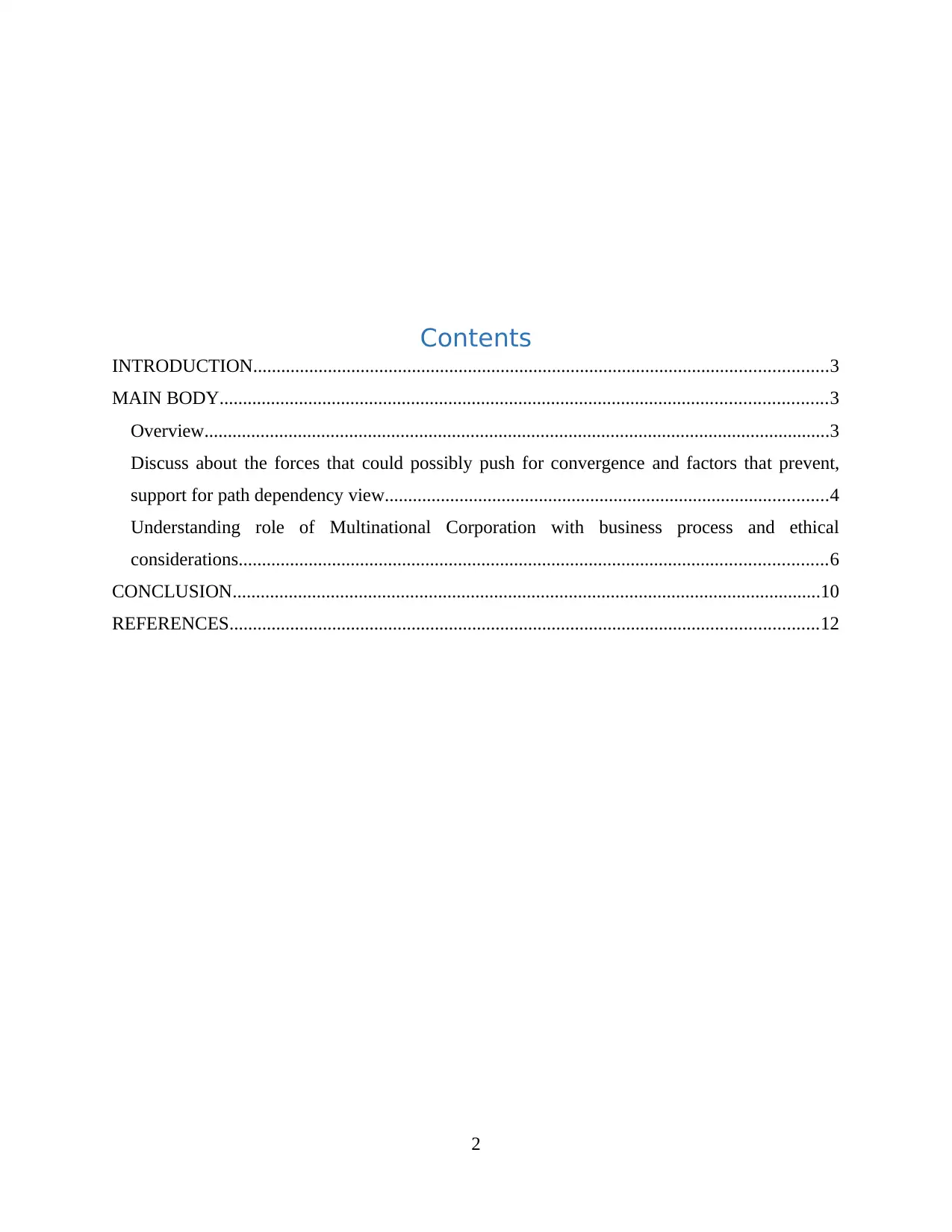
Contents
INTRODUCTION...........................................................................................................................3
MAIN BODY..................................................................................................................................3
Overview......................................................................................................................................3
Discuss about the forces that could possibly push for convergence and factors that prevent,
support for path dependency view...............................................................................................4
Understanding role of Multinational Corporation with business process and ethical
considerations..............................................................................................................................6
CONCLUSION..............................................................................................................................10
REFERENCES..............................................................................................................................12
2
INTRODUCTION...........................................................................................................................3
MAIN BODY..................................................................................................................................3
Overview......................................................................................................................................3
Discuss about the forces that could possibly push for convergence and factors that prevent,
support for path dependency view...............................................................................................4
Understanding role of Multinational Corporation with business process and ethical
considerations..............................................................................................................................6
CONCLUSION..............................................................................................................................10
REFERENCES..............................................................................................................................12
2
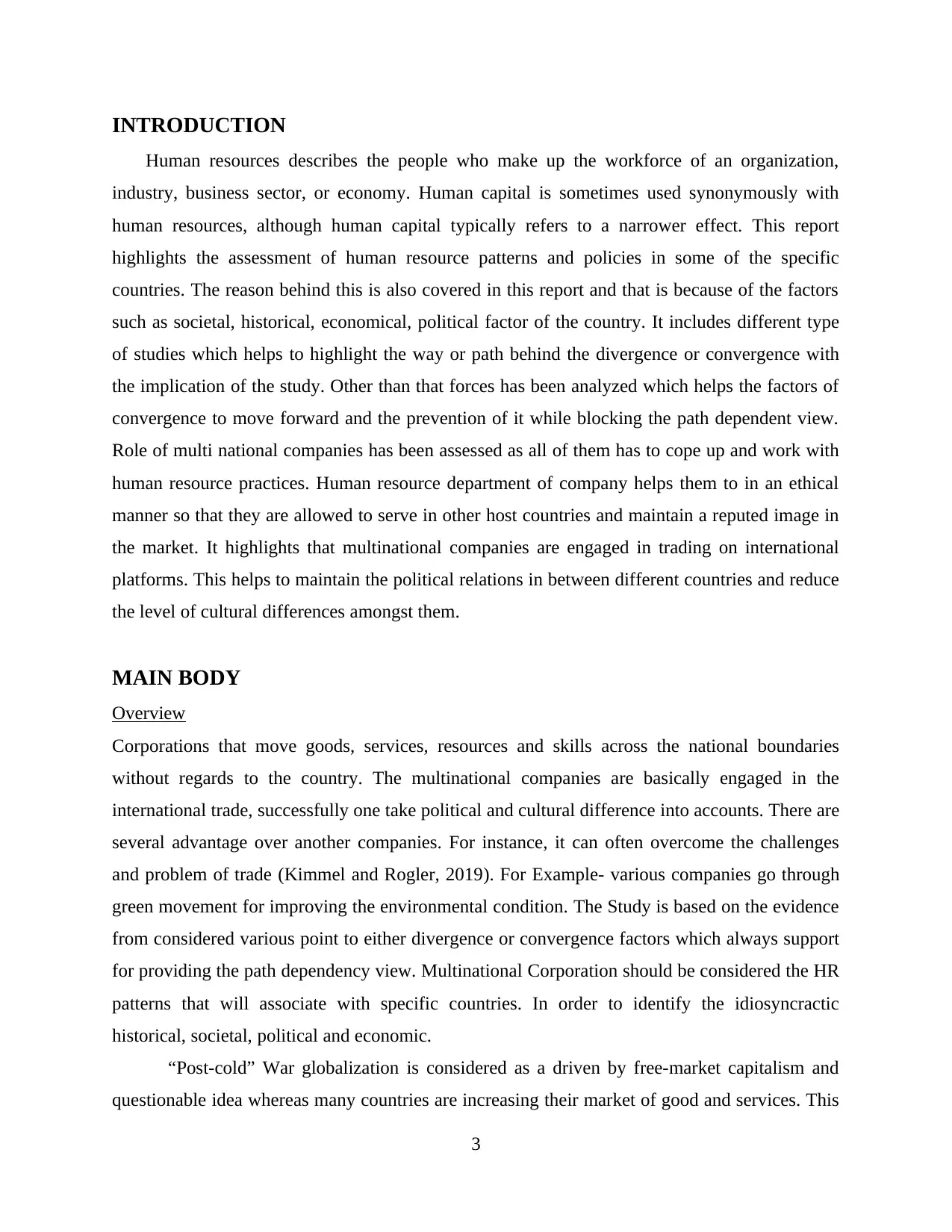
INTRODUCTION
Human resources describes the people who make up the workforce of an organization,
industry, business sector, or economy. Human capital is sometimes used synonymously with
human resources, although human capital typically refers to a narrower effect. This report
highlights the assessment of human resource patterns and policies in some of the specific
countries. The reason behind this is also covered in this report and that is because of the factors
such as societal, historical, economical, political factor of the country. It includes different type
of studies which helps to highlight the way or path behind the divergence or convergence with
the implication of the study. Other than that forces has been analyzed which helps the factors of
convergence to move forward and the prevention of it while blocking the path dependent view.
Role of multi national companies has been assessed as all of them has to cope up and work with
human resource practices. Human resource department of company helps them to in an ethical
manner so that they are allowed to serve in other host countries and maintain a reputed image in
the market. It highlights that multinational companies are engaged in trading on international
platforms. This helps to maintain the political relations in between different countries and reduce
the level of cultural differences amongst them.
MAIN BODY
Overview
Corporations that move goods, services, resources and skills across the national boundaries
without regards to the country. The multinational companies are basically engaged in the
international trade, successfully one take political and cultural difference into accounts. There are
several advantage over another companies. For instance, it can often overcome the challenges
and problem of trade (Kimmel and Rogler, 2019). For Example- various companies go through
green movement for improving the environmental condition. The Study is based on the evidence
from considered various point to either divergence or convergence factors which always support
for providing the path dependency view. Multinational Corporation should be considered the HR
patterns that will associate with specific countries. In order to identify the idiosyncractic
historical, societal, political and economic.
“Post-cold” War globalization is considered as a driven by free-market capitalism and
questionable idea whereas many countries are increasing their market of good and services. This
3
Human resources describes the people who make up the workforce of an organization,
industry, business sector, or economy. Human capital is sometimes used synonymously with
human resources, although human capital typically refers to a narrower effect. This report
highlights the assessment of human resource patterns and policies in some of the specific
countries. The reason behind this is also covered in this report and that is because of the factors
such as societal, historical, economical, political factor of the country. It includes different type
of studies which helps to highlight the way or path behind the divergence or convergence with
the implication of the study. Other than that forces has been analyzed which helps the factors of
convergence to move forward and the prevention of it while blocking the path dependent view.
Role of multi national companies has been assessed as all of them has to cope up and work with
human resource practices. Human resource department of company helps them to in an ethical
manner so that they are allowed to serve in other host countries and maintain a reputed image in
the market. It highlights that multinational companies are engaged in trading on international
platforms. This helps to maintain the political relations in between different countries and reduce
the level of cultural differences amongst them.
MAIN BODY
Overview
Corporations that move goods, services, resources and skills across the national boundaries
without regards to the country. The multinational companies are basically engaged in the
international trade, successfully one take political and cultural difference into accounts. There are
several advantage over another companies. For instance, it can often overcome the challenges
and problem of trade (Kimmel and Rogler, 2019). For Example- various companies go through
green movement for improving the environmental condition. The Study is based on the evidence
from considered various point to either divergence or convergence factors which always support
for providing the path dependency view. Multinational Corporation should be considered the HR
patterns that will associate with specific countries. In order to identify the idiosyncractic
historical, societal, political and economic.
“Post-cold” War globalization is considered as a driven by free-market capitalism and
questionable idea whereas many countries are increasing their market of good and services. This
3
⊘ This is a preview!⊘
Do you want full access?
Subscribe today to unlock all pages.

Trusted by 1+ million students worldwide
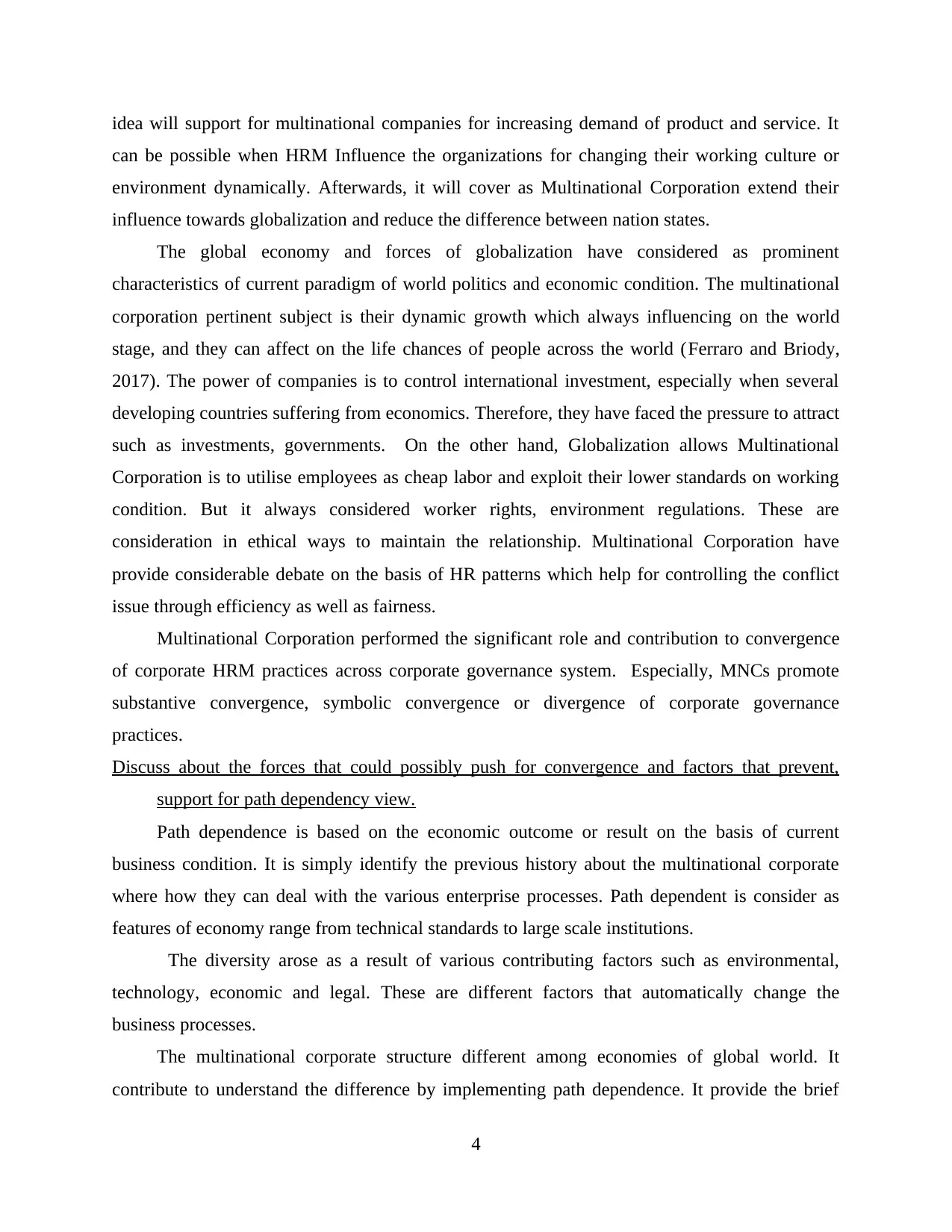
idea will support for multinational companies for increasing demand of product and service. It
can be possible when HRM Influence the organizations for changing their working culture or
environment dynamically. Afterwards, it will cover as Multinational Corporation extend their
influence towards globalization and reduce the difference between nation states.
The global economy and forces of globalization have considered as prominent
characteristics of current paradigm of world politics and economic condition. The multinational
corporation pertinent subject is their dynamic growth which always influencing on the world
stage, and they can affect on the life chances of people across the world (Ferraro and Briody,
2017). The power of companies is to control international investment, especially when several
developing countries suffering from economics. Therefore, they have faced the pressure to attract
such as investments, governments. On the other hand, Globalization allows Multinational
Corporation is to utilise employees as cheap labor and exploit their lower standards on working
condition. But it always considered worker rights, environment regulations. These are
consideration in ethical ways to maintain the relationship. Multinational Corporation have
provide considerable debate on the basis of HR patterns which help for controlling the conflict
issue through efficiency as well as fairness.
Multinational Corporation performed the significant role and contribution to convergence
of corporate HRM practices across corporate governance system. Especially, MNCs promote
substantive convergence, symbolic convergence or divergence of corporate governance
practices.
Discuss about the forces that could possibly push for convergence and factors that prevent,
support for path dependency view.
Path dependence is based on the economic outcome or result on the basis of current
business condition. It is simply identify the previous history about the multinational corporate
where how they can deal with the various enterprise processes. Path dependent is consider as
features of economy range from technical standards to large scale institutions.
The diversity arose as a result of various contributing factors such as environmental,
technology, economic and legal. These are different factors that automatically change the
business processes.
The multinational corporate structure different among economies of global world. It
contribute to understand the difference by implementing path dependence. It provide the brief
4
can be possible when HRM Influence the organizations for changing their working culture or
environment dynamically. Afterwards, it will cover as Multinational Corporation extend their
influence towards globalization and reduce the difference between nation states.
The global economy and forces of globalization have considered as prominent
characteristics of current paradigm of world politics and economic condition. The multinational
corporation pertinent subject is their dynamic growth which always influencing on the world
stage, and they can affect on the life chances of people across the world (Ferraro and Briody,
2017). The power of companies is to control international investment, especially when several
developing countries suffering from economics. Therefore, they have faced the pressure to attract
such as investments, governments. On the other hand, Globalization allows Multinational
Corporation is to utilise employees as cheap labor and exploit their lower standards on working
condition. But it always considered worker rights, environment regulations. These are
consideration in ethical ways to maintain the relationship. Multinational Corporation have
provide considerable debate on the basis of HR patterns which help for controlling the conflict
issue through efficiency as well as fairness.
Multinational Corporation performed the significant role and contribution to convergence
of corporate HRM practices across corporate governance system. Especially, MNCs promote
substantive convergence, symbolic convergence or divergence of corporate governance
practices.
Discuss about the forces that could possibly push for convergence and factors that prevent,
support for path dependency view.
Path dependence is based on the economic outcome or result on the basis of current
business condition. It is simply identify the previous history about the multinational corporate
where how they can deal with the various enterprise processes. Path dependent is consider as
features of economy range from technical standards to large scale institutions.
The diversity arose as a result of various contributing factors such as environmental,
technology, economic and legal. These are different factors that automatically change the
business processes.
The multinational corporate structure different among economies of global world. It
contribute to understand the difference by implementing path dependence. It provide the brief
4
Paraphrase This Document
Need a fresh take? Get an instant paraphrase of this document with our AI Paraphraser
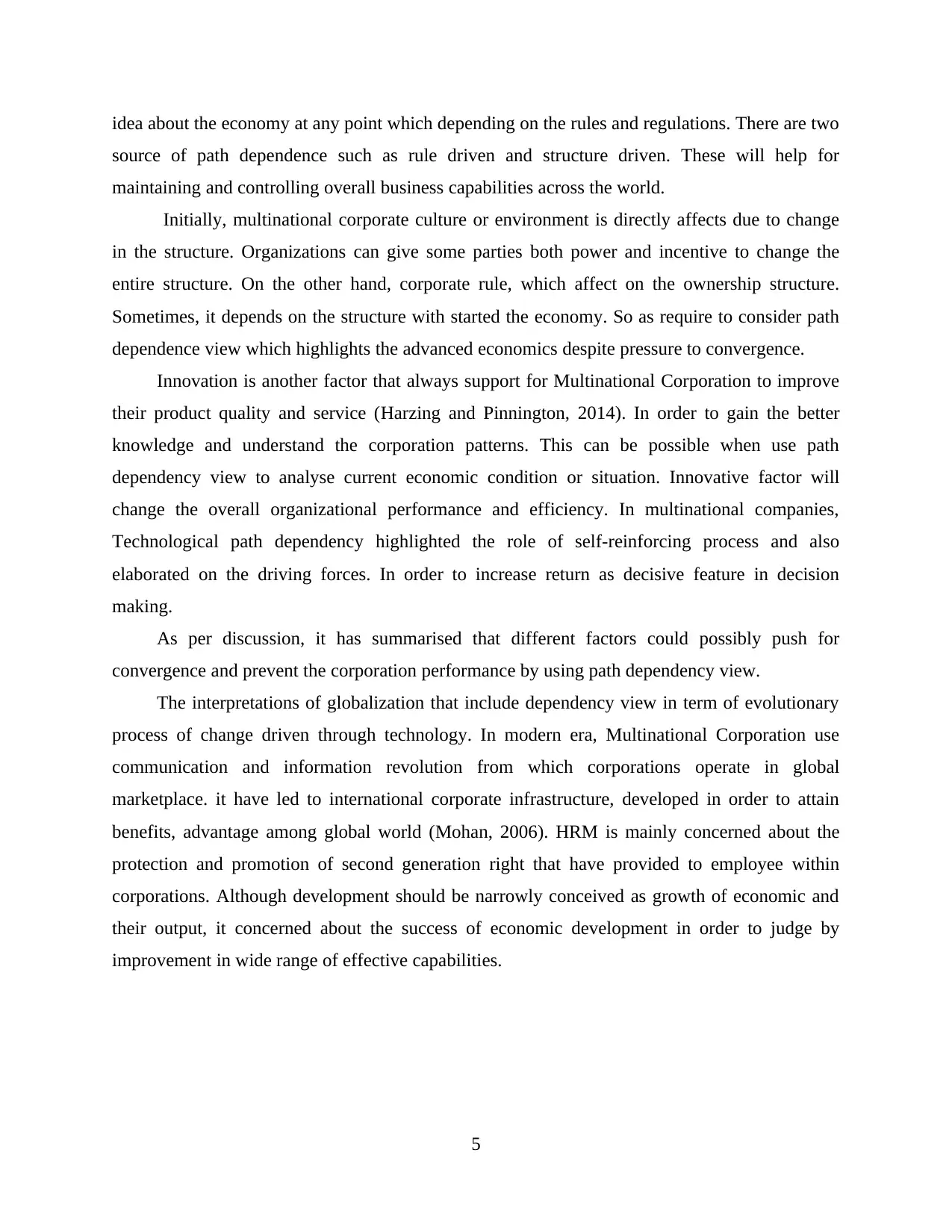
idea about the economy at any point which depending on the rules and regulations. There are two
source of path dependence such as rule driven and structure driven. These will help for
maintaining and controlling overall business capabilities across the world.
Initially, multinational corporate culture or environment is directly affects due to change
in the structure. Organizations can give some parties both power and incentive to change the
entire structure. On the other hand, corporate rule, which affect on the ownership structure.
Sometimes, it depends on the structure with started the economy. So as require to consider path
dependence view which highlights the advanced economics despite pressure to convergence.
Innovation is another factor that always support for Multinational Corporation to improve
their product quality and service (Harzing and Pinnington, 2014). In order to gain the better
knowledge and understand the corporation patterns. This can be possible when use path
dependency view to analyse current economic condition or situation. Innovative factor will
change the overall organizational performance and efficiency. In multinational companies,
Technological path dependency highlighted the role of self-reinforcing process and also
elaborated on the driving forces. In order to increase return as decisive feature in decision
making.
As per discussion, it has summarised that different factors could possibly push for
convergence and prevent the corporation performance by using path dependency view.
The interpretations of globalization that include dependency view in term of evolutionary
process of change driven through technology. In modern era, Multinational Corporation use
communication and information revolution from which corporations operate in global
marketplace. it have led to international corporate infrastructure, developed in order to attain
benefits, advantage among global world (Mohan, 2006). HRM is mainly concerned about the
protection and promotion of second generation right that have provided to employee within
corporations. Although development should be narrowly conceived as growth of economic and
their output, it concerned about the success of economic development in order to judge by
improvement in wide range of effective capabilities.
5
source of path dependence such as rule driven and structure driven. These will help for
maintaining and controlling overall business capabilities across the world.
Initially, multinational corporate culture or environment is directly affects due to change
in the structure. Organizations can give some parties both power and incentive to change the
entire structure. On the other hand, corporate rule, which affect on the ownership structure.
Sometimes, it depends on the structure with started the economy. So as require to consider path
dependence view which highlights the advanced economics despite pressure to convergence.
Innovation is another factor that always support for Multinational Corporation to improve
their product quality and service (Harzing and Pinnington, 2014). In order to gain the better
knowledge and understand the corporation patterns. This can be possible when use path
dependency view to analyse current economic condition or situation. Innovative factor will
change the overall organizational performance and efficiency. In multinational companies,
Technological path dependency highlighted the role of self-reinforcing process and also
elaborated on the driving forces. In order to increase return as decisive feature in decision
making.
As per discussion, it has summarised that different factors could possibly push for
convergence and prevent the corporation performance by using path dependency view.
The interpretations of globalization that include dependency view in term of evolutionary
process of change driven through technology. In modern era, Multinational Corporation use
communication and information revolution from which corporations operate in global
marketplace. it have led to international corporate infrastructure, developed in order to attain
benefits, advantage among global world (Mohan, 2006). HRM is mainly concerned about the
protection and promotion of second generation right that have provided to employee within
corporations. Although development should be narrowly conceived as growth of economic and
their output, it concerned about the success of economic development in order to judge by
improvement in wide range of effective capabilities.
5
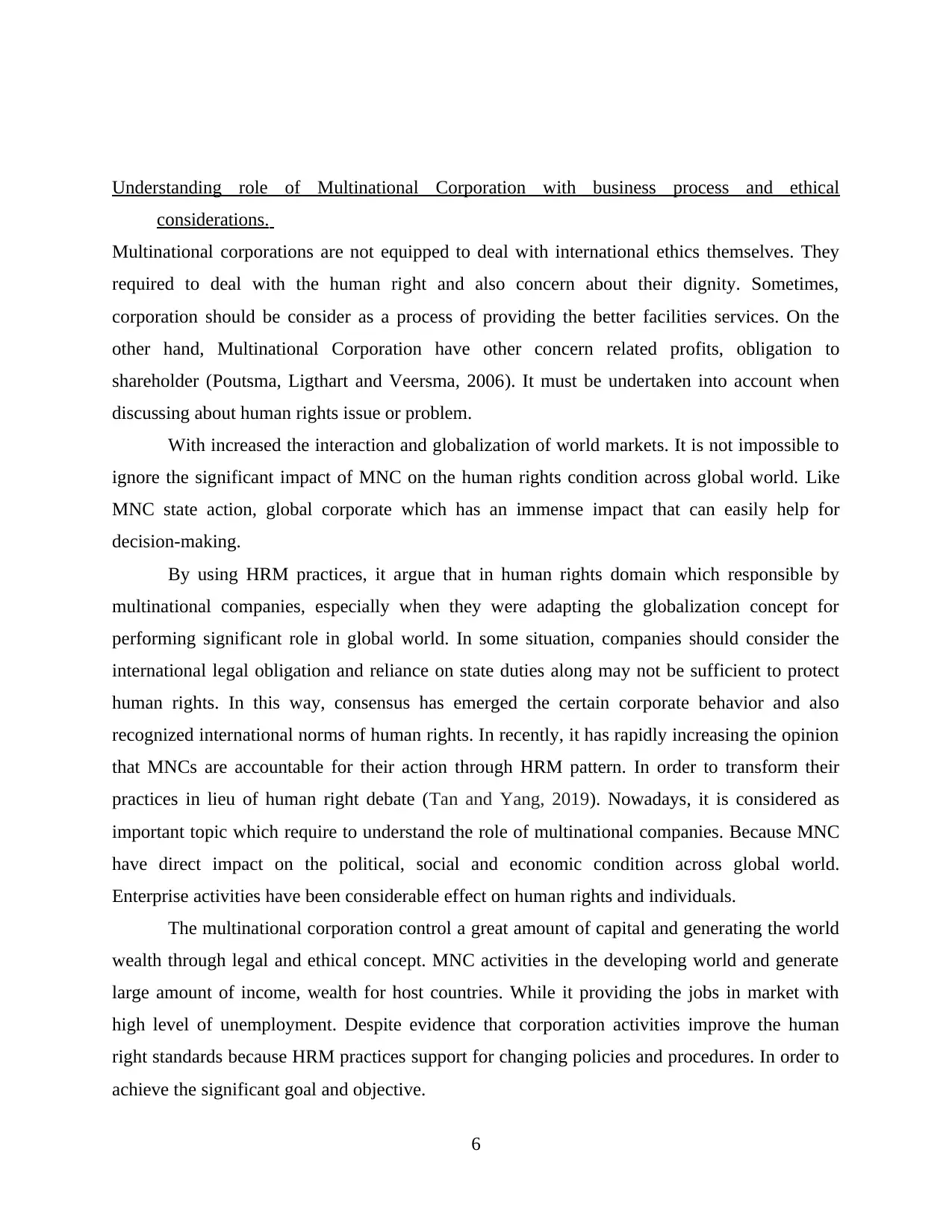
Understanding role of Multinational Corporation with business process and ethical
considerations.
Multinational corporations are not equipped to deal with international ethics themselves. They
required to deal with the human right and also concern about their dignity. Sometimes,
corporation should be consider as a process of providing the better facilities services. On the
other hand, Multinational Corporation have other concern related profits, obligation to
shareholder (Poutsma, Ligthart and Veersma, 2006). It must be undertaken into account when
discussing about human rights issue or problem.
With increased the interaction and globalization of world markets. It is not impossible to
ignore the significant impact of MNC on the human rights condition across global world. Like
MNC state action, global corporate which has an immense impact that can easily help for
decision-making.
By using HRM practices, it argue that in human rights domain which responsible by
multinational companies, especially when they were adapting the globalization concept for
performing significant role in global world. In some situation, companies should consider the
international legal obligation and reliance on state duties along may not be sufficient to protect
human rights. In this way, consensus has emerged the certain corporate behavior and also
recognized international norms of human rights. In recently, it has rapidly increasing the opinion
that MNCs are accountable for their action through HRM pattern. In order to transform their
practices in lieu of human right debate (Tan and Yang, 2019). Nowadays, it is considered as
important topic which require to understand the role of multinational companies. Because MNC
have direct impact on the political, social and economic condition across global world.
Enterprise activities have been considerable effect on human rights and individuals.
The multinational corporation control a great amount of capital and generating the world
wealth through legal and ethical concept. MNC activities in the developing world and generate
large amount of income, wealth for host countries. While it providing the jobs in market with
high level of unemployment. Despite evidence that corporation activities improve the human
right standards because HRM practices support for changing policies and procedures. In order to
achieve the significant goal and objective.
6
considerations.
Multinational corporations are not equipped to deal with international ethics themselves. They
required to deal with the human right and also concern about their dignity. Sometimes,
corporation should be consider as a process of providing the better facilities services. On the
other hand, Multinational Corporation have other concern related profits, obligation to
shareholder (Poutsma, Ligthart and Veersma, 2006). It must be undertaken into account when
discussing about human rights issue or problem.
With increased the interaction and globalization of world markets. It is not impossible to
ignore the significant impact of MNC on the human rights condition across global world. Like
MNC state action, global corporate which has an immense impact that can easily help for
decision-making.
By using HRM practices, it argue that in human rights domain which responsible by
multinational companies, especially when they were adapting the globalization concept for
performing significant role in global world. In some situation, companies should consider the
international legal obligation and reliance on state duties along may not be sufficient to protect
human rights. In this way, consensus has emerged the certain corporate behavior and also
recognized international norms of human rights. In recently, it has rapidly increasing the opinion
that MNCs are accountable for their action through HRM pattern. In order to transform their
practices in lieu of human right debate (Tan and Yang, 2019). Nowadays, it is considered as
important topic which require to understand the role of multinational companies. Because MNC
have direct impact on the political, social and economic condition across global world.
Enterprise activities have been considerable effect on human rights and individuals.
The multinational corporation control a great amount of capital and generating the world
wealth through legal and ethical concept. MNC activities in the developing world and generate
large amount of income, wealth for host countries. While it providing the jobs in market with
high level of unemployment. Despite evidence that corporation activities improve the human
right standards because HRM practices support for changing policies and procedures. In order to
achieve the significant goal and objective.
6
⊘ This is a preview!⊘
Do you want full access?
Subscribe today to unlock all pages.

Trusted by 1+ million students worldwide
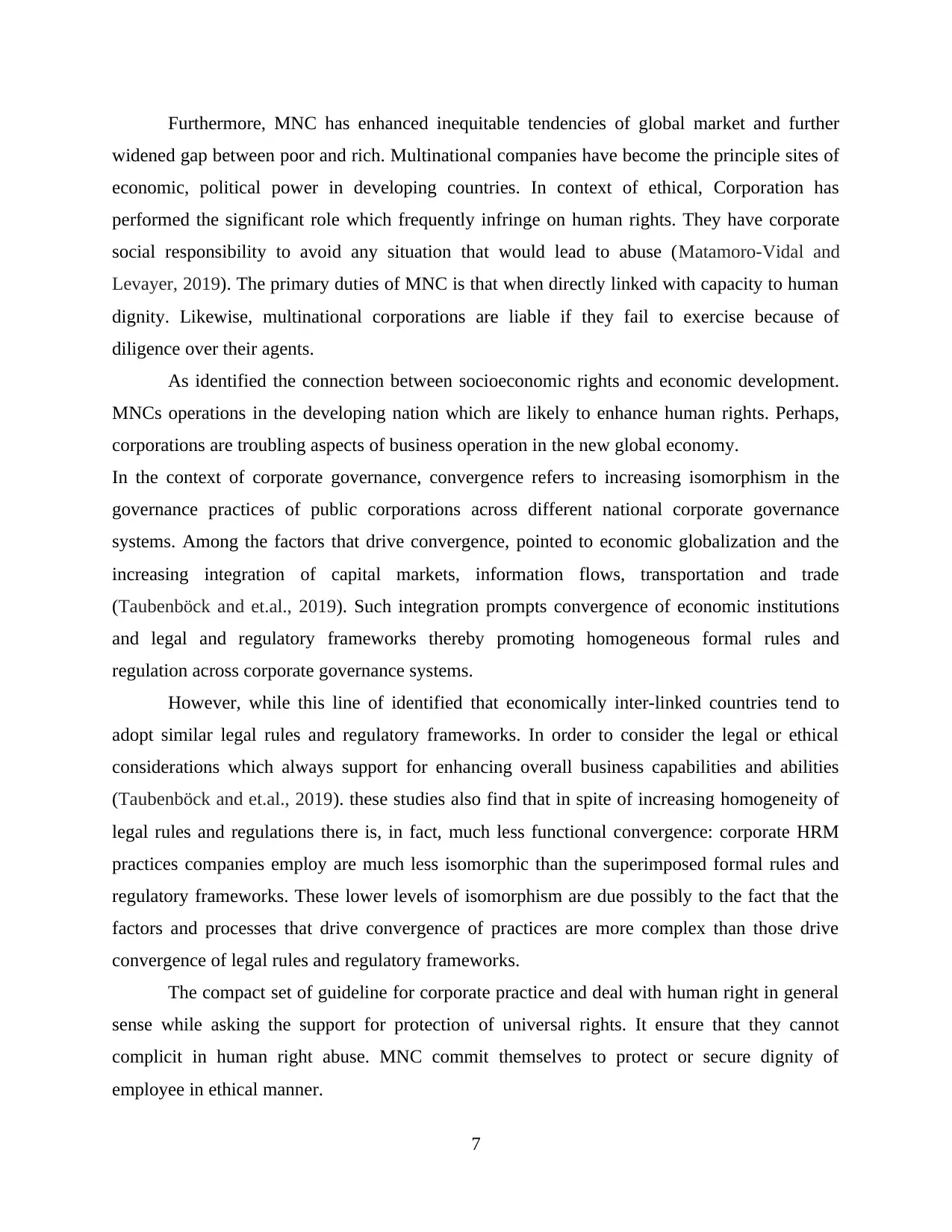
Furthermore, MNC has enhanced inequitable tendencies of global market and further
widened gap between poor and rich. Multinational companies have become the principle sites of
economic, political power in developing countries. In context of ethical, Corporation has
performed the significant role which frequently infringe on human rights. They have corporate
social responsibility to avoid any situation that would lead to abuse (Matamoro-Vidal and
Levayer, 2019). The primary duties of MNC is that when directly linked with capacity to human
dignity. Likewise, multinational corporations are liable if they fail to exercise because of
diligence over their agents.
As identified the connection between socioeconomic rights and economic development.
MNCs operations in the developing nation which are likely to enhance human rights. Perhaps,
corporations are troubling aspects of business operation in the new global economy.
In the context of corporate governance, convergence refers to increasing isomorphism in the
governance practices of public corporations across different national corporate governance
systems. Among the factors that drive convergence, pointed to economic globalization and the
increasing integration of capital markets, information flows, transportation and trade
(Taubenböck and et.al., 2019). Such integration prompts convergence of economic institutions
and legal and regulatory frameworks thereby promoting homogeneous formal rules and
regulation across corporate governance systems.
However, while this line of identified that economically inter-linked countries tend to
adopt similar legal rules and regulatory frameworks. In order to consider the legal or ethical
considerations which always support for enhancing overall business capabilities and abilities
(Taubenböck and et.al., 2019). these studies also find that in spite of increasing homogeneity of
legal rules and regulations there is, in fact, much less functional convergence: corporate HRM
practices companies employ are much less isomorphic than the superimposed formal rules and
regulatory frameworks. These lower levels of isomorphism are due possibly to the fact that the
factors and processes that drive convergence of practices are more complex than those drive
convergence of legal rules and regulatory frameworks.
The compact set of guideline for corporate practice and deal with human right in general
sense while asking the support for protection of universal rights. It ensure that they cannot
complicit in human right abuse. MNC commit themselves to protect or secure dignity of
employee in ethical manner.
7
widened gap between poor and rich. Multinational companies have become the principle sites of
economic, political power in developing countries. In context of ethical, Corporation has
performed the significant role which frequently infringe on human rights. They have corporate
social responsibility to avoid any situation that would lead to abuse (Matamoro-Vidal and
Levayer, 2019). The primary duties of MNC is that when directly linked with capacity to human
dignity. Likewise, multinational corporations are liable if they fail to exercise because of
diligence over their agents.
As identified the connection between socioeconomic rights and economic development.
MNCs operations in the developing nation which are likely to enhance human rights. Perhaps,
corporations are troubling aspects of business operation in the new global economy.
In the context of corporate governance, convergence refers to increasing isomorphism in the
governance practices of public corporations across different national corporate governance
systems. Among the factors that drive convergence, pointed to economic globalization and the
increasing integration of capital markets, information flows, transportation and trade
(Taubenböck and et.al., 2019). Such integration prompts convergence of economic institutions
and legal and regulatory frameworks thereby promoting homogeneous formal rules and
regulation across corporate governance systems.
However, while this line of identified that economically inter-linked countries tend to
adopt similar legal rules and regulatory frameworks. In order to consider the legal or ethical
considerations which always support for enhancing overall business capabilities and abilities
(Taubenböck and et.al., 2019). these studies also find that in spite of increasing homogeneity of
legal rules and regulations there is, in fact, much less functional convergence: corporate HRM
practices companies employ are much less isomorphic than the superimposed formal rules and
regulatory frameworks. These lower levels of isomorphism are due possibly to the fact that the
factors and processes that drive convergence of practices are more complex than those drive
convergence of legal rules and regulatory frameworks.
The compact set of guideline for corporate practice and deal with human right in general
sense while asking the support for protection of universal rights. It ensure that they cannot
complicit in human right abuse. MNC commit themselves to protect or secure dignity of
employee in ethical manner.
7
Paraphrase This Document
Need a fresh take? Get an instant paraphrase of this document with our AI Paraphraser
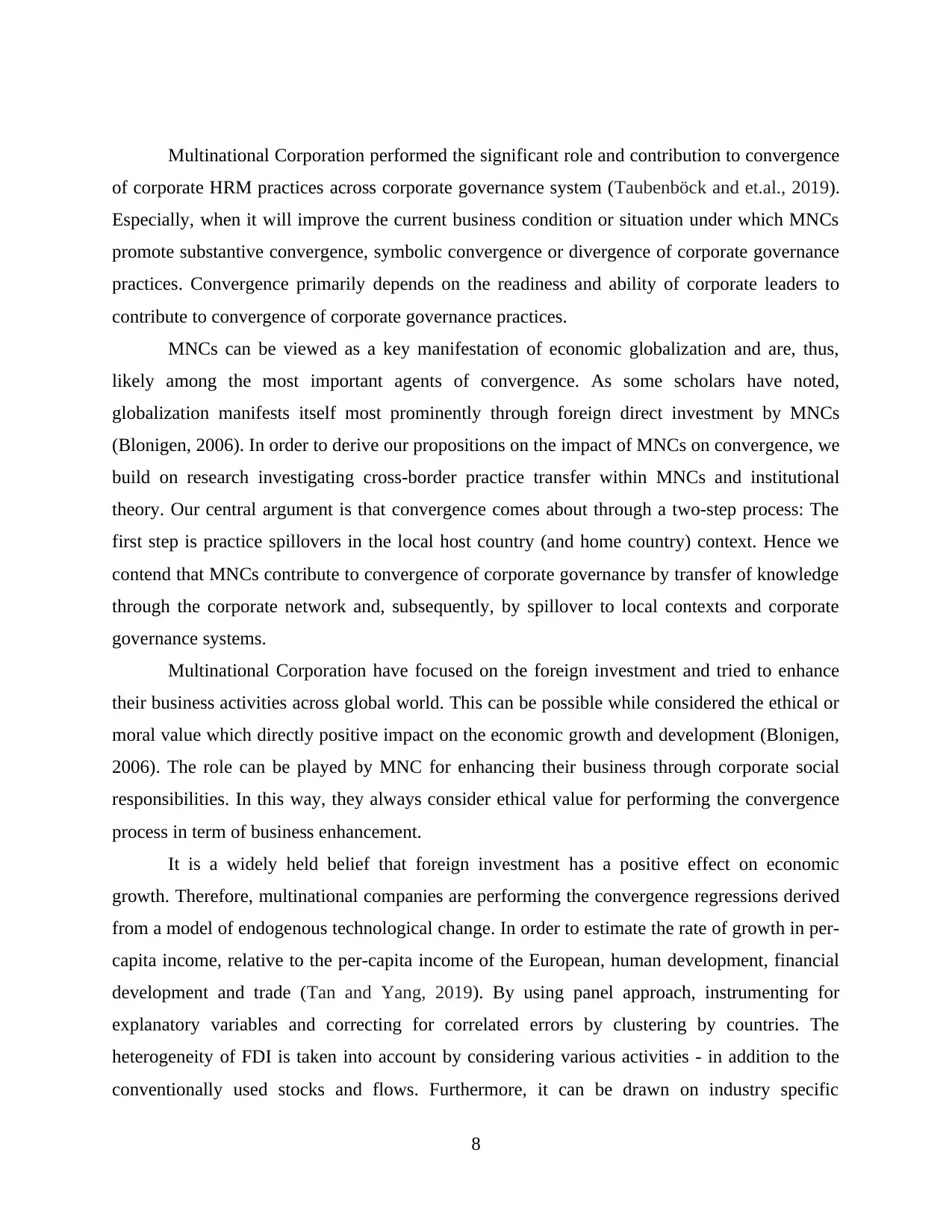
Multinational Corporation performed the significant role and contribution to convergence
of corporate HRM practices across corporate governance system (Taubenböck and et.al., 2019).
Especially, when it will improve the current business condition or situation under which MNCs
promote substantive convergence, symbolic convergence or divergence of corporate governance
practices. Convergence primarily depends on the readiness and ability of corporate leaders to
contribute to convergence of corporate governance practices.
MNCs can be viewed as a key manifestation of economic globalization and are, thus,
likely among the most important agents of convergence. As some scholars have noted,
globalization manifests itself most prominently through foreign direct investment by MNCs
(Blonigen, 2006). In order to derive our propositions on the impact of MNCs on convergence, we
build on research investigating cross-border practice transfer within MNCs and institutional
theory. Our central argument is that convergence comes about through a two-step process: The
first step is practice spillovers in the local host country (and home country) context. Hence we
contend that MNCs contribute to convergence of corporate governance by transfer of knowledge
through the corporate network and, subsequently, by spillover to local contexts and corporate
governance systems.
Multinational Corporation have focused on the foreign investment and tried to enhance
their business activities across global world. This can be possible while considered the ethical or
moral value which directly positive impact on the economic growth and development (Blonigen,
2006). The role can be played by MNC for enhancing their business through corporate social
responsibilities. In this way, they always consider ethical value for performing the convergence
process in term of business enhancement.
It is a widely held belief that foreign investment has a positive effect on economic
growth. Therefore, multinational companies are performing the convergence regressions derived
from a model of endogenous technological change. In order to estimate the rate of growth in per-
capita income, relative to the per-capita income of the European, human development, financial
development and trade (Tan and Yang, 2019). By using panel approach, instrumenting for
explanatory variables and correcting for correlated errors by clustering by countries. The
heterogeneity of FDI is taken into account by considering various activities - in addition to the
conventionally used stocks and flows. Furthermore, it can be drawn on industry specific
8
of corporate HRM practices across corporate governance system (Taubenböck and et.al., 2019).
Especially, when it will improve the current business condition or situation under which MNCs
promote substantive convergence, symbolic convergence or divergence of corporate governance
practices. Convergence primarily depends on the readiness and ability of corporate leaders to
contribute to convergence of corporate governance practices.
MNCs can be viewed as a key manifestation of economic globalization and are, thus,
likely among the most important agents of convergence. As some scholars have noted,
globalization manifests itself most prominently through foreign direct investment by MNCs
(Blonigen, 2006). In order to derive our propositions on the impact of MNCs on convergence, we
build on research investigating cross-border practice transfer within MNCs and institutional
theory. Our central argument is that convergence comes about through a two-step process: The
first step is practice spillovers in the local host country (and home country) context. Hence we
contend that MNCs contribute to convergence of corporate governance by transfer of knowledge
through the corporate network and, subsequently, by spillover to local contexts and corporate
governance systems.
Multinational Corporation have focused on the foreign investment and tried to enhance
their business activities across global world. This can be possible while considered the ethical or
moral value which directly positive impact on the economic growth and development (Blonigen,
2006). The role can be played by MNC for enhancing their business through corporate social
responsibilities. In this way, they always consider ethical value for performing the convergence
process in term of business enhancement.
It is a widely held belief that foreign investment has a positive effect on economic
growth. Therefore, multinational companies are performing the convergence regressions derived
from a model of endogenous technological change. In order to estimate the rate of growth in per-
capita income, relative to the per-capita income of the European, human development, financial
development and trade (Tan and Yang, 2019). By using panel approach, instrumenting for
explanatory variables and correcting for correlated errors by clustering by countries. The
heterogeneity of FDI is taken into account by considering various activities - in addition to the
conventionally used stocks and flows. Furthermore, it can be drawn on industry specific
8
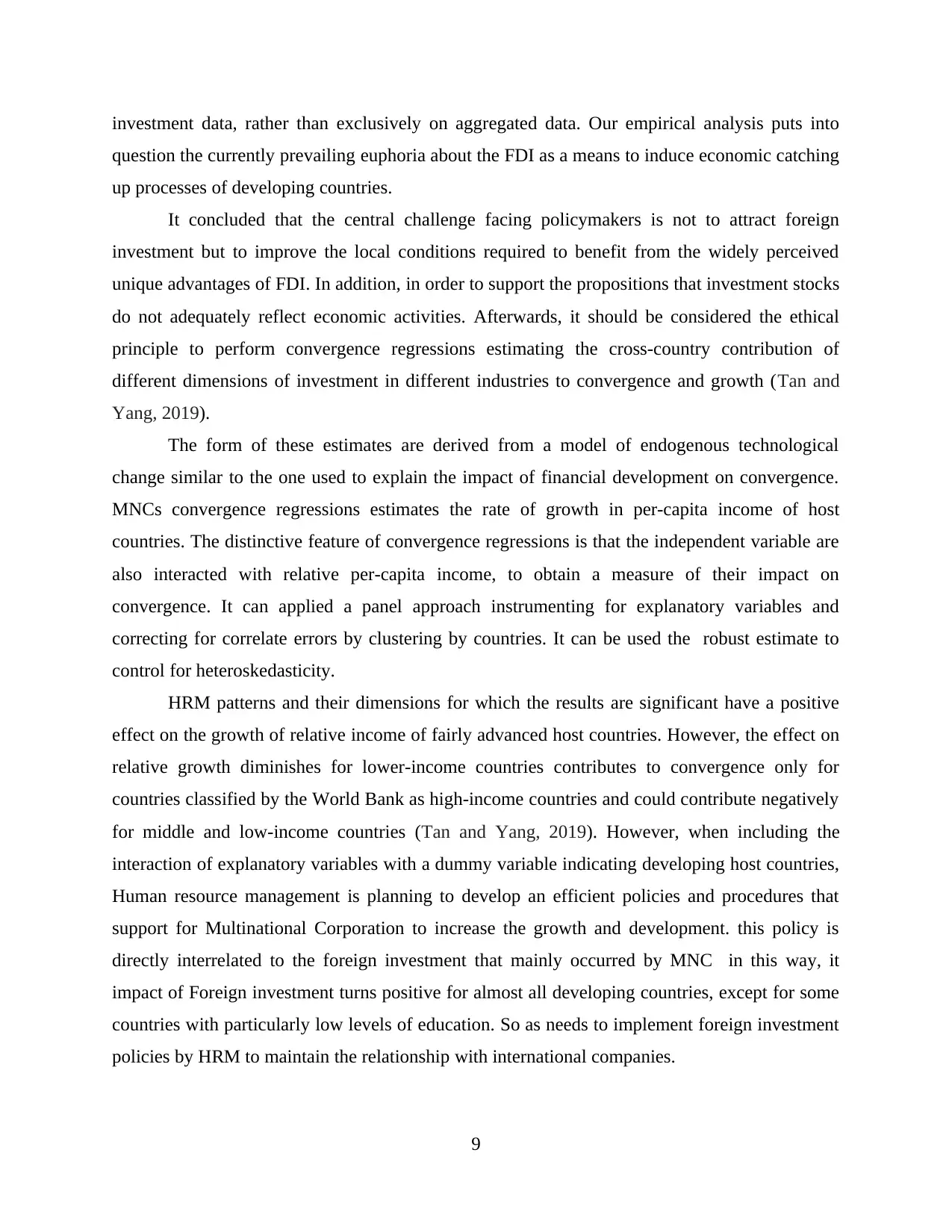
investment data, rather than exclusively on aggregated data. Our empirical analysis puts into
question the currently prevailing euphoria about the FDI as a means to induce economic catching
up processes of developing countries.
It concluded that the central challenge facing policymakers is not to attract foreign
investment but to improve the local conditions required to benefit from the widely perceived
unique advantages of FDI. In addition, in order to support the propositions that investment stocks
do not adequately reflect economic activities. Afterwards, it should be considered the ethical
principle to perform convergence regressions estimating the cross-country contribution of
different dimensions of investment in different industries to convergence and growth (Tan and
Yang, 2019).
The form of these estimates are derived from a model of endogenous technological
change similar to the one used to explain the impact of financial development on convergence.
MNCs convergence regressions estimates the rate of growth in per-capita income of host
countries. The distinctive feature of convergence regressions is that the independent variable are
also interacted with relative per-capita income, to obtain a measure of their impact on
convergence. It can applied a panel approach instrumenting for explanatory variables and
correcting for correlate errors by clustering by countries. It can be used the robust estimate to
control for heteroskedasticity.
HRM patterns and their dimensions for which the results are significant have a positive
effect on the growth of relative income of fairly advanced host countries. However, the effect on
relative growth diminishes for lower-income countries contributes to convergence only for
countries classified by the World Bank as high-income countries and could contribute negatively
for middle and low-income countries (Tan and Yang, 2019). However, when including the
interaction of explanatory variables with a dummy variable indicating developing host countries,
Human resource management is planning to develop an efficient policies and procedures that
support for Multinational Corporation to increase the growth and development. this policy is
directly interrelated to the foreign investment that mainly occurred by MNC in this way, it
impact of Foreign investment turns positive for almost all developing countries, except for some
countries with particularly low levels of education. So as needs to implement foreign investment
policies by HRM to maintain the relationship with international companies.
9
question the currently prevailing euphoria about the FDI as a means to induce economic catching
up processes of developing countries.
It concluded that the central challenge facing policymakers is not to attract foreign
investment but to improve the local conditions required to benefit from the widely perceived
unique advantages of FDI. In addition, in order to support the propositions that investment stocks
do not adequately reflect economic activities. Afterwards, it should be considered the ethical
principle to perform convergence regressions estimating the cross-country contribution of
different dimensions of investment in different industries to convergence and growth (Tan and
Yang, 2019).
The form of these estimates are derived from a model of endogenous technological
change similar to the one used to explain the impact of financial development on convergence.
MNCs convergence regressions estimates the rate of growth in per-capita income of host
countries. The distinctive feature of convergence regressions is that the independent variable are
also interacted with relative per-capita income, to obtain a measure of their impact on
convergence. It can applied a panel approach instrumenting for explanatory variables and
correcting for correlate errors by clustering by countries. It can be used the robust estimate to
control for heteroskedasticity.
HRM patterns and their dimensions for which the results are significant have a positive
effect on the growth of relative income of fairly advanced host countries. However, the effect on
relative growth diminishes for lower-income countries contributes to convergence only for
countries classified by the World Bank as high-income countries and could contribute negatively
for middle and low-income countries (Tan and Yang, 2019). However, when including the
interaction of explanatory variables with a dummy variable indicating developing host countries,
Human resource management is planning to develop an efficient policies and procedures that
support for Multinational Corporation to increase the growth and development. this policy is
directly interrelated to the foreign investment that mainly occurred by MNC in this way, it
impact of Foreign investment turns positive for almost all developing countries, except for some
countries with particularly low levels of education. So as needs to implement foreign investment
policies by HRM to maintain the relationship with international companies.
9
⊘ This is a preview!⊘
Do you want full access?
Subscribe today to unlock all pages.

Trusted by 1+ million students worldwide
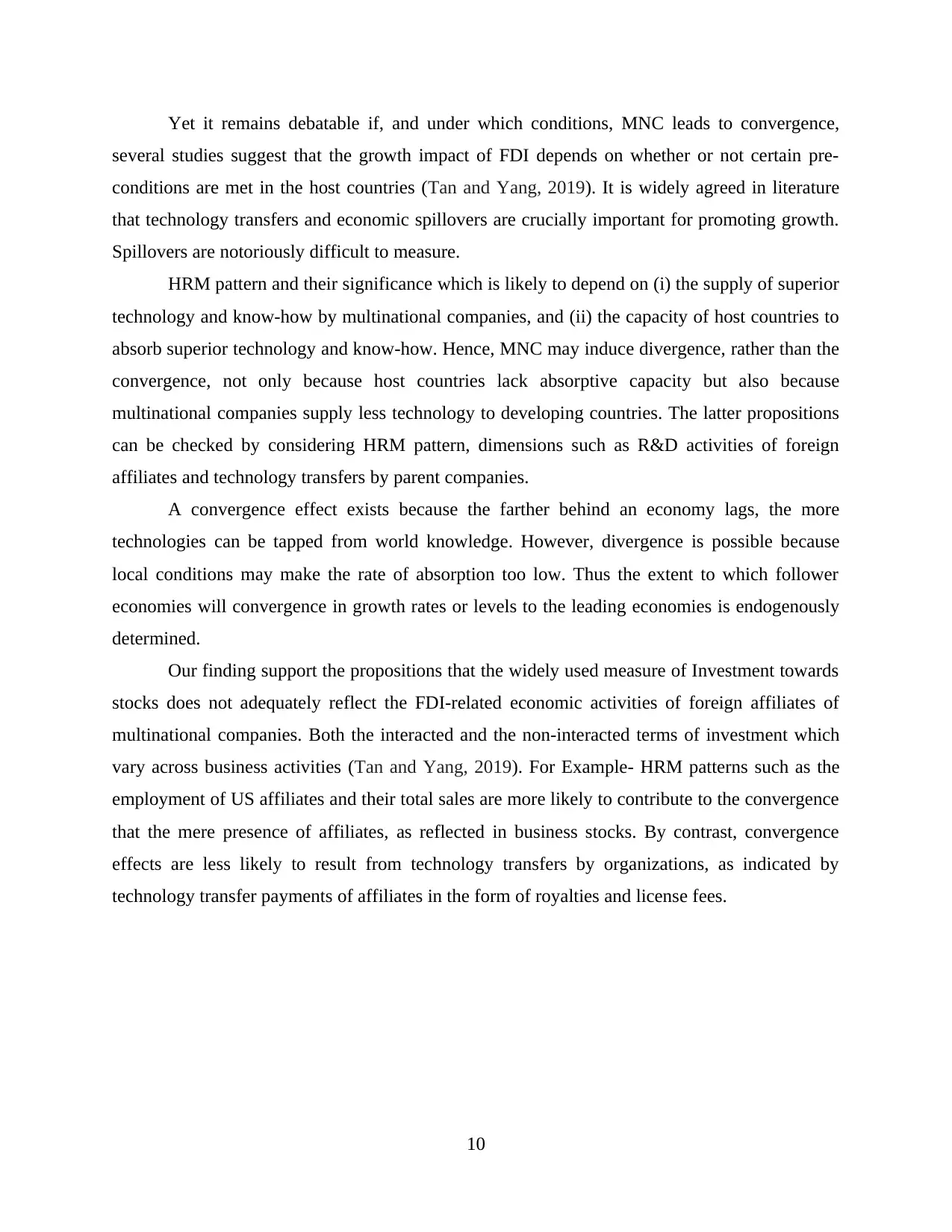
Yet it remains debatable if, and under which conditions, MNC leads to convergence,
several studies suggest that the growth impact of FDI depends on whether or not certain pre-
conditions are met in the host countries (Tan and Yang, 2019). It is widely agreed in literature
that technology transfers and economic spillovers are crucially important for promoting growth.
Spillovers are notoriously difficult to measure.
HRM pattern and their significance which is likely to depend on (i) the supply of superior
technology and know-how by multinational companies, and (ii) the capacity of host countries to
absorb superior technology and know-how. Hence, MNC may induce divergence, rather than the
convergence, not only because host countries lack absorptive capacity but also because
multinational companies supply less technology to developing countries. The latter propositions
can be checked by considering HRM pattern, dimensions such as R&D activities of foreign
affiliates and technology transfers by parent companies.
A convergence effect exists because the farther behind an economy lags, the more
technologies can be tapped from world knowledge. However, divergence is possible because
local conditions may make the rate of absorption too low. Thus the extent to which follower
economies will convergence in growth rates or levels to the leading economies is endogenously
determined.
Our finding support the propositions that the widely used measure of Investment towards
stocks does not adequately reflect the FDI-related economic activities of foreign affiliates of
multinational companies. Both the interacted and the non-interacted terms of investment which
vary across business activities (Tan and Yang, 2019). For Example- HRM patterns such as the
employment of US affiliates and their total sales are more likely to contribute to the convergence
that the mere presence of affiliates, as reflected in business stocks. By contrast, convergence
effects are less likely to result from technology transfers by organizations, as indicated by
technology transfer payments of affiliates in the form of royalties and license fees.
10
several studies suggest that the growth impact of FDI depends on whether or not certain pre-
conditions are met in the host countries (Tan and Yang, 2019). It is widely agreed in literature
that technology transfers and economic spillovers are crucially important for promoting growth.
Spillovers are notoriously difficult to measure.
HRM pattern and their significance which is likely to depend on (i) the supply of superior
technology and know-how by multinational companies, and (ii) the capacity of host countries to
absorb superior technology and know-how. Hence, MNC may induce divergence, rather than the
convergence, not only because host countries lack absorptive capacity but also because
multinational companies supply less technology to developing countries. The latter propositions
can be checked by considering HRM pattern, dimensions such as R&D activities of foreign
affiliates and technology transfers by parent companies.
A convergence effect exists because the farther behind an economy lags, the more
technologies can be tapped from world knowledge. However, divergence is possible because
local conditions may make the rate of absorption too low. Thus the extent to which follower
economies will convergence in growth rates or levels to the leading economies is endogenously
determined.
Our finding support the propositions that the widely used measure of Investment towards
stocks does not adequately reflect the FDI-related economic activities of foreign affiliates of
multinational companies. Both the interacted and the non-interacted terms of investment which
vary across business activities (Tan and Yang, 2019). For Example- HRM patterns such as the
employment of US affiliates and their total sales are more likely to contribute to the convergence
that the mere presence of affiliates, as reflected in business stocks. By contrast, convergence
effects are less likely to result from technology transfers by organizations, as indicated by
technology transfer payments of affiliates in the form of royalties and license fees.
10
Paraphrase This Document
Need a fresh take? Get an instant paraphrase of this document with our AI Paraphraser
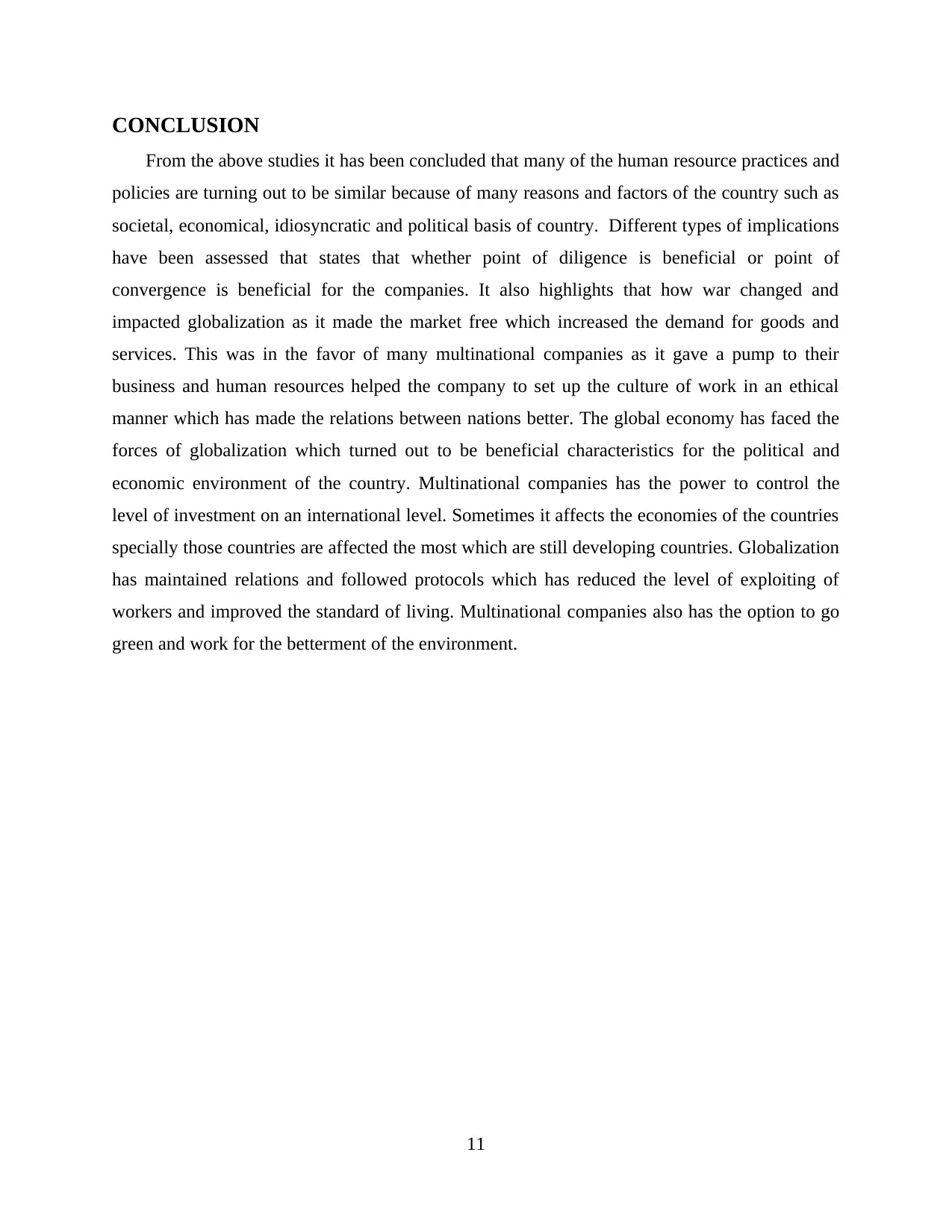
CONCLUSION
From the above studies it has been concluded that many of the human resource practices and
policies are turning out to be similar because of many reasons and factors of the country such as
societal, economical, idiosyncratic and political basis of country. Different types of implications
have been assessed that states that whether point of diligence is beneficial or point of
convergence is beneficial for the companies. It also highlights that how war changed and
impacted globalization as it made the market free which increased the demand for goods and
services. This was in the favor of many multinational companies as it gave a pump to their
business and human resources helped the company to set up the culture of work in an ethical
manner which has made the relations between nations better. The global economy has faced the
forces of globalization which turned out to be beneficial characteristics for the political and
economic environment of the country. Multinational companies has the power to control the
level of investment on an international level. Sometimes it affects the economies of the countries
specially those countries are affected the most which are still developing countries. Globalization
has maintained relations and followed protocols which has reduced the level of exploiting of
workers and improved the standard of living. Multinational companies also has the option to go
green and work for the betterment of the environment.
11
From the above studies it has been concluded that many of the human resource practices and
policies are turning out to be similar because of many reasons and factors of the country such as
societal, economical, idiosyncratic and political basis of country. Different types of implications
have been assessed that states that whether point of diligence is beneficial or point of
convergence is beneficial for the companies. It also highlights that how war changed and
impacted globalization as it made the market free which increased the demand for goods and
services. This was in the favor of many multinational companies as it gave a pump to their
business and human resources helped the company to set up the culture of work in an ethical
manner which has made the relations between nations better. The global economy has faced the
forces of globalization which turned out to be beneficial characteristics for the political and
economic environment of the country. Multinational companies has the power to control the
level of investment on an international level. Sometimes it affects the economies of the countries
specially those countries are affected the most which are still developing countries. Globalization
has maintained relations and followed protocols which has reduced the level of exploiting of
workers and improved the standard of living. Multinational companies also has the option to go
green and work for the betterment of the environment.
11
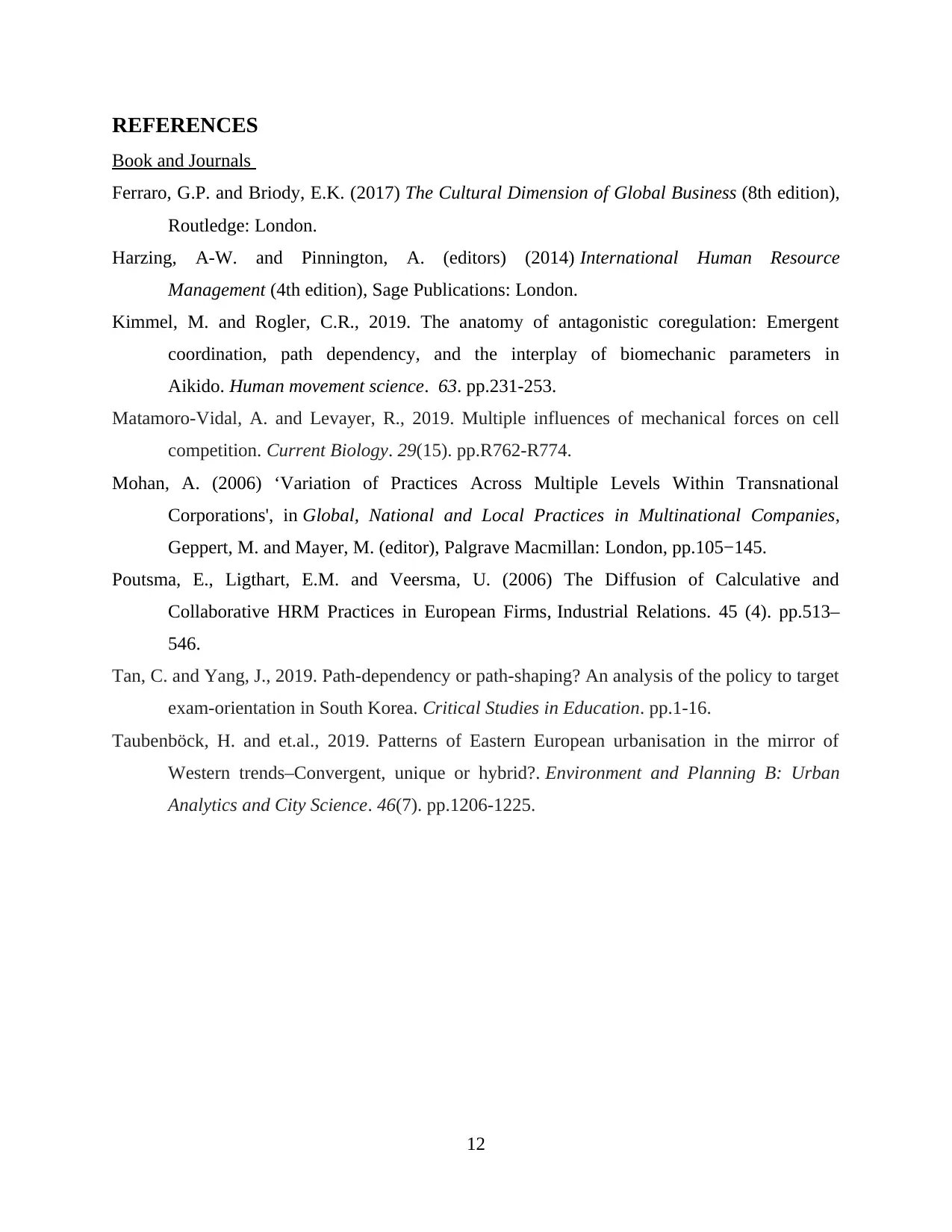
REFERENCES
Book and Journals
Ferraro, G.P. and Briody, E.K. (2017) The Cultural Dimension of Global Business (8th edition),
Routledge: London.
Harzing, A-W. and Pinnington, A. (editors) (2014) International Human Resource
Management (4th edition), Sage Publications: London.
Kimmel, M. and Rogler, C.R., 2019. The anatomy of antagonistic coregulation: Emergent
coordination, path dependency, and the interplay of biomechanic parameters in
Aikido. Human movement science. 63. pp.231-253.
Matamoro-Vidal, A. and Levayer, R., 2019. Multiple influences of mechanical forces on cell
competition. Current Biology. 29(15). pp.R762-R774.
Mohan, A. (2006) ‘Variation of Practices Across Multiple Levels Within Transnational
Corporations', in Global, National and Local Practices in Multinational Companies,
Geppert, M. and Mayer, M. (editor), Palgrave Macmillan: London, pp.105−145.
Poutsma, E., Ligthart, E.M. and Veersma, U. (2006) The Diffusion of Calculative and
Collaborative HRM Practices in European Firms, Industrial Relations. 45 (4). pp.513–
546.
Tan, C. and Yang, J., 2019. Path-dependency or path-shaping? An analysis of the policy to target
exam-orientation in South Korea. Critical Studies in Education. pp.1-16.
Taubenböck, H. and et.al., 2019. Patterns of Eastern European urbanisation in the mirror of
Western trends–Convergent, unique or hybrid?. Environment and Planning B: Urban
Analytics and City Science. 46(7). pp.1206-1225.
12
Book and Journals
Ferraro, G.P. and Briody, E.K. (2017) The Cultural Dimension of Global Business (8th edition),
Routledge: London.
Harzing, A-W. and Pinnington, A. (editors) (2014) International Human Resource
Management (4th edition), Sage Publications: London.
Kimmel, M. and Rogler, C.R., 2019. The anatomy of antagonistic coregulation: Emergent
coordination, path dependency, and the interplay of biomechanic parameters in
Aikido. Human movement science. 63. pp.231-253.
Matamoro-Vidal, A. and Levayer, R., 2019. Multiple influences of mechanical forces on cell
competition. Current Biology. 29(15). pp.R762-R774.
Mohan, A. (2006) ‘Variation of Practices Across Multiple Levels Within Transnational
Corporations', in Global, National and Local Practices in Multinational Companies,
Geppert, M. and Mayer, M. (editor), Palgrave Macmillan: London, pp.105−145.
Poutsma, E., Ligthart, E.M. and Veersma, U. (2006) The Diffusion of Calculative and
Collaborative HRM Practices in European Firms, Industrial Relations. 45 (4). pp.513–
546.
Tan, C. and Yang, J., 2019. Path-dependency or path-shaping? An analysis of the policy to target
exam-orientation in South Korea. Critical Studies in Education. pp.1-16.
Taubenböck, H. and et.al., 2019. Patterns of Eastern European urbanisation in the mirror of
Western trends–Convergent, unique or hybrid?. Environment and Planning B: Urban
Analytics and City Science. 46(7). pp.1206-1225.
12
⊘ This is a preview!⊘
Do you want full access?
Subscribe today to unlock all pages.

Trusted by 1+ million students worldwide
1 out of 12
Related Documents
Your All-in-One AI-Powered Toolkit for Academic Success.
+13062052269
info@desklib.com
Available 24*7 on WhatsApp / Email
![[object Object]](/_next/static/media/star-bottom.7253800d.svg)
Unlock your academic potential
Copyright © 2020–2026 A2Z Services. All Rights Reserved. Developed and managed by ZUCOL.





